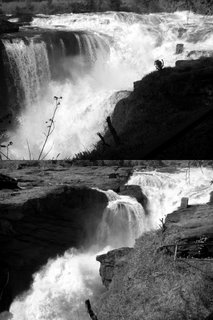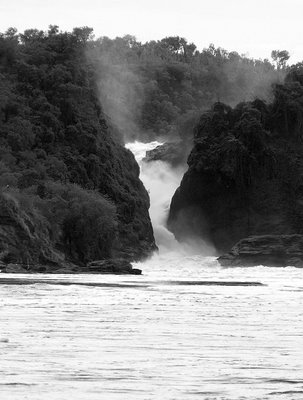Swamp
Confessions of an Academic Pseudo-Giraffe
25.9.06
The effects of privatisation?
 How interesting. Two days ago I was writing something about how landscapes are always framed by human presence, and then I just accidentally chanced upon these two photos I've taken of Murchison Falls, Uganda.
How interesting. Two days ago I was writing something about how landscapes are always framed by human presence, and then I just accidentally chanced upon these two photos I've taken of Murchison Falls, Uganda.The top one is from January 2005, and the bottom one from April 2006. You might not believe it, but January is part of the dry season, while April is, on average, one of the rainiest.
Uganda is dependent on water power, and currently plagued by a power crisis. By a subjective estimate, in January 2005 we had about ten hours per week without electricity in Kampala, the capital. In April 2006, it must have been close to 50 hours. The water power plants in Jinja, at the source of the Nile, largely generate the country's power. They use the water flowing from lake Victoria to the river. Murchison Falls are located several hundred kilometres down the river. Neighboring countries have blamed Uganda for the low water levels in the lake, saying that the dams in Jinja have let through too much water to sustain healthy levels. This year, the lake hasn't had any extra water to spare. Less power for the people, less water for the falls.
Uganda's power sector was recently privatised and supply is now controlled by a company called Umeme. According to one source, the government will pocket over $360 million from the deal over the next twenty years. Electricity generation has since fallen by at least a third, prices have hiked accordingly, most offices where customers could pay their bills (in person - this the only way) have been closed, and newspapers have been filled with letters to the editor cursing the new distributor. The top picture is pre-Umeme, the bottom one is post-privatisation. What do they say about pictures and... how many thousands of words?
 Well, here are the falls from below, just for fun. This 7-metre-wide gorge and 45-metre drop creates what is often called the most powerful natural flow of water on earth. I don't know how that could be counted. Maybe someone forgot the Gulf Stream. But standing on the brink, it's very easy to believe that this is the most violent. I bet they'd like to harness this one. See the concrete blocks in the pictures? There used to be a bridge, but it was simply washed away.
Well, here are the falls from below, just for fun. This 7-metre-wide gorge and 45-metre drop creates what is often called the most powerful natural flow of water on earth. I don't know how that could be counted. Maybe someone forgot the Gulf Stream. But standing on the brink, it's very easy to believe that this is the most violent. I bet they'd like to harness this one. See the concrete blocks in the pictures? There used to be a bridge, but it was simply washed away.
18.9.06
Ten days have passed since the stressful day of 8 September (my dissertation defence), and I’m looking back upon the occasion with satisfaction. Everything went as planned: during the discussion I never froze completely and was able to defend my position plausibly enough. Despite all the admirable principles behind it, there is something absurd, even perverse, about a public scrutiny like that, what with all the pre-set stances and antagonism implied by the official vocabulary, the formal attire (we wore university gowns), and the fact that most of the discussion is not exactly accessible to most of the spectators. I’m glad we (my esteemed Opponent and I) were not overwhelmed by the circumstances and were able to talk almost informally at times, even add some humour to the discourse. Perhaps this was because both of us have the background (and the mentality) of a middle distance runner. We talked about this shortly before we strode down to the lecture hall. The few minutes before the startgun sounds are often filled with intolerable anxiety, but the gun removes the tension, leaving only concentration (and some aggression, as it is a contact sport). Luckily we were also able to hide the aggression during the discussion.
Another slightly strange fact about this ordeal is that it takes place after the work has been sealed, the crime committed, the damage done. If the dissertation has serious shortcomings even after the pre-examination and still gets printed, the opponent’s job somewhat resembles a post mortem: he is a forensic expert examining the corpse in a car wreck, not a policeman trying to prevent reckless behaviour in traffic. He is merely explaining to the audience how the driver lost control of the car, how his lungs were pierced and head severed. There may be lots of gory detail, but it does not necessarily even get written down. Even before the final investigation, the crash (of a dissertation) has been typed and proofread, bound and shelved, made immutable.
To be honest, there never was much nervousness. There was slightly more in the evening, at the karonkka dinner. As one kind professor instructed me beforehand, the candidate in fact has no reason to be nervous before the public defence. He or she always has the best knowledge of that particular topic, and if any difficulties arise, it’s merely because the opponent is asking odd questions. I think this advice should be delivered to all doctoral candidates along with all the other material on the public defence.
Another slightly strange fact about this ordeal is that it takes place after the work has been sealed, the crime committed, the damage done. If the dissertation has serious shortcomings even after the pre-examination and still gets printed, the opponent’s job somewhat resembles a post mortem: he is a forensic expert examining the corpse in a car wreck, not a policeman trying to prevent reckless behaviour in traffic. He is merely explaining to the audience how the driver lost control of the car, how his lungs were pierced and head severed. There may be lots of gory detail, but it does not necessarily even get written down. Even before the final investigation, the crash (of a dissertation) has been typed and proofread, bound and shelved, made immutable.
To be honest, there never was much nervousness. There was slightly more in the evening, at the karonkka dinner. As one kind professor instructed me beforehand, the candidate in fact has no reason to be nervous before the public defence. He or she always has the best knowledge of that particular topic, and if any difficulties arise, it’s merely because the opponent is asking odd questions. I think this advice should be delivered to all doctoral candidates along with all the other material on the public defence.

